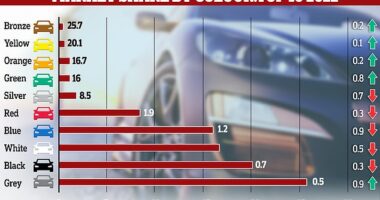STUDENT bank accounts are specifically aimed at people who are studying at college or university, helping them to navigate their finances at a time when managing money can be tricky.
Here is all you need to know about how to find and apply for the best student bank account.
Going to university may be your first ever taste of personal and financial freedom.
But you will have bills to pay such as energy and rent, as well as food, drinks and books to buy.
That is where a student account comes in.
What is a student account?
Student accounts are specifically set up by banks to appeal to people studying in the UK.
It may be the first account you set up if you have previously lived at home and not needed to manage your own finances.
A student account is a current account for people going to university.
The main difference between a normal current account and student accounts is the interest-free overdraft facility and freebies.
Do I need a student bank account?
It is not compulsory to have a student bank account, but you will need some form of bank account so you can pay your bills and receive your student loan.
Student bank accounts are tailored to those in higher education and offer attractive extras, such as an interest-free overdraft, railcards and even Amazon Prime membership.
You can also open a student bank account for postgraduates.
There used to be dedicated products for postgraduate students but nowadays you can apply for a switch to a normal student account or extend your own.
Some accounts may only be available to full-time students, so it may be harder to find a suitable account if you are studying part-time.
Similarly, international students may not be eligible for UK-based account.
You could open a separate overseas product, and some banks do offer international student accounts .
The best international student bank accounts may provide freebies and currency transfers but there may be monthly fees and not all offer overdrafts.
Do I need a student bank account for student finance?
You can apply for a student loan to pay your annual tuition fees in instalments each term and it goes straight to your university.
There is also a separate maintenance loan that is paid three times a year and goes straight to a bank account in your name.
It doesn’t have to be a student bank account you have, but it may be worth considering one due to the overdraft and perks that may be on offer.
How do I open a student bank account?
Student accounts are offered by a range of high street banks.
Most require you to be either over 17-years-old or over 18, and you’ll need to have been accepted onto a full-time UCAS course at a UK institution lasting at least two years.
Similar to opening a standard bank account, you will need to prove your identity with a passport or driving licence and proof of address.
You also need some extra documents when opening a student account to confirm you are actually going to university.
The bank may ask for your UCAS code that you receive once you have a university place, or a letter confirming your course and place of study.
Some banks may require you to apply before you begin your course or within a few months of starting university.
Most providers will let you open a student bank account online, but you have to show original documents that prove you are studying; rather than copies.
This means you will still have to visit a branch or send the relevant documents in the post.
Advantages of student bank accounts?
Because of stiff competition between providers, there are often lots of attractive student bank account offers.
One of the most attractive perks of student bank account is an interest-free overdraft.
This can be as much as £3,000 and can essentially function as an interest-free loan.
Some accounts may even pay interest on your balance up to a certain limit.
The best student bank accounts may also offer freebies to attract customers.
This could include discount cards, cashback , coach and railcards or subscriptions to streaming services.
Disadvantages of a student bank account
This may be the first time you are in charge of managing your money, so you have to choose your account and overdraft carefully.
Remember an overdraft isn’t free money.
After you graduate you still have to repay everything you have borrowed and interest may kick in on graduating.
Plus, if you go beyond your authorised overdraft limit at any point you might face additional charges.
If you think this may happen you should speak to your bank immediately, as it could hurt your credit rating and ability to borrow in the future.
Account freebies are worth considering, but think carefully about what you will save if you choose to go with a certain provider.
For example, a bank may offer perks such as a railcard or Amazon Prime subscription but a small overdraft. So think about what is more important to you.
Make sure the bank account you choose offers all the features you need first, before you are swayed by free gifts.
When can you get a student bank account?
You can only apply for a student bank account once you have an offer or have accepted a place for your university course.
It is a good idea to set up your account before the term starts so you have somewhere to receive your student loan and to setup payments for rent and other bills.
Some banks and building societies may require you to open a new account either before or within the first few months of starting your course.
Can I switch student bank accounts?
Most student bank account providers are part of the current account switching service.
This means they can manage the transfer of all your direct debits and standing orders, as well as the closure of your old account automatically in seven working days.
If you already have a current account, you could switch to a student bank account before starting university.
It is also possible to switch between student accounts, but you will need to check each bank’s criteria as some may only allow new students.
Can student loans take money from my account?
Unlike a traditional loan, student finance doesn’t have to be repaid straight away and you only have to start making repayments once you earn above a certain salary.
When a student needs to start paying back their loan – and how much they have to pay – depends on which repayment plan they are on.
Plan One (Loans taken out before September 1, 2012 in England or Wales)
- If a student’s income is more than £1,615 a month (before tax and deductions) or £19,390 a year, they will start repaying their loan the April after leaving their course.
- The amount they need to pay back will change on April 6 every year.
- Students will stop paying if their income drops below this amount.
Plan Two (Loans taken on or after September 1, 2012)
- If a student’s income is more than £2,214 a month (before tax and other deductions) or £26,568 a year, they will start repaying their loan the April after finishing their course – or, if they are studying part-time, the April four years after the course started.
Repayments are taken out from a person’s salary at the same time as tax.
Students can make voluntary repayments through the Student Loans Company (SLC).
If you drop out of university early you will still be charged tuition fees for however much of the term is remaining.
You will still only have to repay your tuition loan back once you earn above the repayment threshold.
However, the SLC may want you to setup a repayment plan for your maintenance loan if it has given you money in advance that you will no longer use.
Can you have more than one student account?
A condition of most student bank accounts is that you pay your student finance into it.
This ultimately means that unlike standard current or savings accounts you can only have one student account.
You may be able to switch accounts though if you find a better deal.
Can I get a student bank account with bad credit?
Your credit report will be checked when you apply for a student bank account.
If you have a bad credit rating or unpaid debts it may be harder to get approved for an overdraft and you may not even be allowed to open an account if you are seen as too much of a risk.
Another option could be to apply for a “no frills” basic bank account that offers somewhere to send and receive money, as well as a debit card for spending and withdrawals.
But you are unlikely to get an overdrafts or any perks such as cashback or freebies.
What is the best student bank account?
The best student bank account will depend on your needs.
Compare the features on offer such as overdrafts , any interest paid and freebies on offer.
For example, a student account offering a free railcard could be good if you are living far from home and regularly travelling by train but may not be worth it if you are staying local.
Check what is on offer from your existing account provider, or you can search for deals in one place using a comparison website.
This post first appeared on thesun.co.uk











